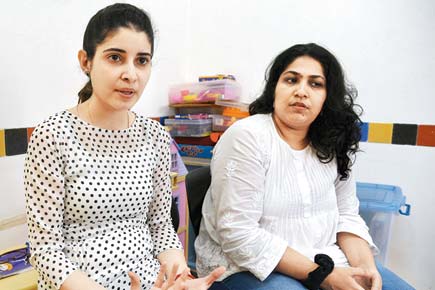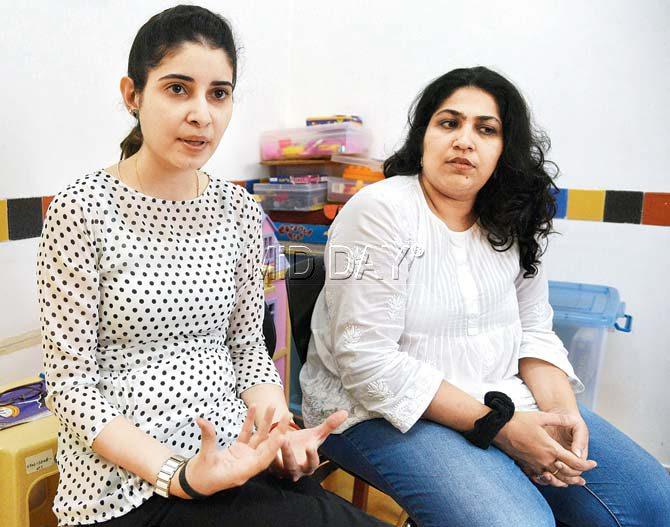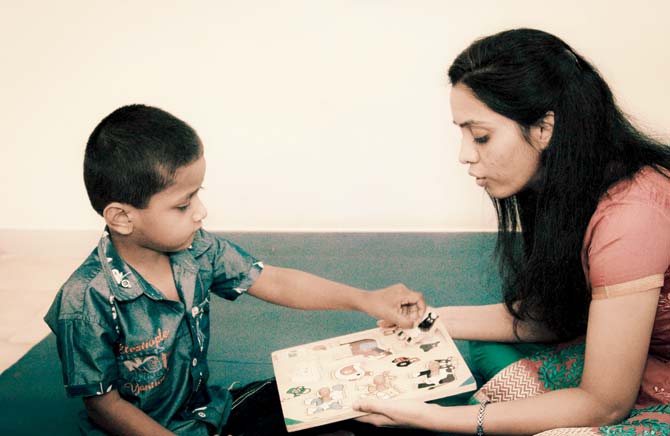Narrative therapy, which aims to empower the patient with self-generated coping skills inspired by fables, is finding eager practitioners at NGO Ummeed


Daisy Daruwalla Bhathena, senior therapist at Ummeed, and Jehnazeb Baldiwala, head of the mental health team, say Narrative Therapy encourages the patient to describe their circumstance and what’s ailing them on their own terms. Pic/Suresh Karkera
While earlier I would tell her what to do, which school was good for her, etc., now I listen to her to understand what she wants,” says 46-year-old Sonali Jain, a community worker with city-based Ra Foundation. The NGO connects with children from less privileged backgrounds and funds their education at residential schools in order to help educate them in a protected environment. The girl Jain is referring to is an orphan who was brought to the attention of the foundation when she was eight years old, as she was being sexually assaulted by her maternal uncle with whom she lived.

A representational picture of an Ummeed counsellor interacting with a child. Ummeed has been using Narrative Therapy, developed in the 1980s by David Epston and Michael White, for the last 10 years
Jain became her counsellor and is now her unofficial guardian. Her more recent conversations with the young girl, now in Std 10, revolve around the teenager wanting to find a part-time job. But, the way the conversations are patterned have shifted in the last 11 months. This is after Jain took a course in Narrative Therapy at the Chinchpokli-based Ummeed Child Development Centre. “From telling her what is right for her, I have changed focus to figure what she wants and why she wants it, and how best she can achieve it,” says Jain. The teenager is now discussing what measures she can take in order to ensure that she has time to spare for a part-time job that won’t interfere with her education, and whether it’s something that she is able to, and willing to.
This involvement of the patient in how the problem should be viewed and dealt with is central to the idea of Narrative therapy. Developed in the 1980s by New Zealand-based David Epston and Australian social worker Michael White (who passed away in 2008), it’s a form of mental and emotional healing in which the therapist is expected to play the role of the ‘influencer’ through conversations. A quote by Epston — “every time we ask a question, we’re generating a possible version of a life — exemplifies this.
Next weekend, a four-day event titled, International Narrative Therapy Conference (October 13 and 18), scheduled at the National Centre for the Performing Arts, will host workshops and conferences to discuss the idea of Narrative therapy.
Jaffer and Singham
Narrative therapy shies away from using labels that have become part of common mental health parlance, such as depression, bipolar, bully, etc. This, says Jehnazeb Baldiwala, head of the mental health team at Ummeed, encourages the patient to describe their circumstance and what’s ailing them on their own terms, while steering clear of internalising the problem. As Daisy Daruwalla Bhathena, senior therapist at Ummeed, says, “The problem is the problem, not the person.”
For instance, in an interaction with five-year-old Jaffer Khan (name changed), an Ummeed community worker said, the senior KG student would mostly be seen outside class. Mischief and aggressive behaviour — troubling kids passing the corridor by teasing and hitting them, slamming or kicking the doors — came to the social worker’s attention.
In a blog for the NGO, she writes that her initial work with Jaffer was done by building a rapport. A typical narrative therapy conversation goes like this:
When anger comes, what does Jaffer do at that time?
How does Jaffer feel when anger comes to him?
How does it look? What is its colour? Can you draw it for me?
Do you want to name it?
Jaffer, writes the Ummeed team, named his anger ‘Singham’ after the character in the Bollywood movie. He drew pictures of a man bold and strong, red in colour and called him ‘Singham’. Jaffer told the Ummeed team that when ‘Singham’ came to him, he would hit, run, slam the door, and not listen. Due to this he said that his friends went away from him and said he was a bad boy. Whenever Singham came to him, Jaffer said, his anger would increase and so he would trouble his teachers and the rest of the class.
The solutions, too, had to come from Jaffer. The questions then turned to “Do you want to keep Singham as a part of your life?” “How should Singham go out of your life?” To reinforce a positive time, questions also lean towards looking at times when the situation or the negative reaction to it are not present. Therefore, “Are there any situations when Singham does not come to you?” Now, a model child, Jaffer is often used as an example for other kids who misbehave.
Pediatrician, Dr Vibha Krishnamurthy, also the founder and medical director of Ummeed, says that Narrative therapy became the predominant form of therapy at the centre as it was the training that Baldiwala had received. “However, soon, through anecdotal evidence, we realised that the families that received this therapy said they felt empowered. In traditional sessions, they felt they were being given gyan,” she says, adding that last year, she too, enrolled for a course. With the children and their families being taught to identify problems and develop the skills they can use to counter them, Dr Krishnamurthy believes that the therapy also ensures less dependence on the therapist.
Some drawbacks
Narrative therapy, has however, some rough edges, admits Baldiwala. While there are some questions that a therapist can start with there is no three-step solution that will help the therapist reach a conclusion. There are maps, outlined over the years, that act as guides.
The other issue is that while it encourages patients to identify why certain behaviours won’t work in the long term, they don’t try and identify why the patient responds to situations a certain way. For instance, traditional therapy would try and probe what about a classroom situation made Jaffer angry. If for instance, it was being told to do homework, what about homework was upsetting.
Cross-disciplinary programme
Yet, feels Dr Krisnamurthy, it is an approach that more and more health experts must adopt, and move away from the “expert model”. “As a pediatrician, we believe we know all and we tell the patients what to do. We do this, because we are not taught any differently. But, I see a shift in that people want to participate in their healthcare and want to choose better. When patients pick their goals, they are more likely to stick to the therapy,” she adds.
Peggy Sax, a Vermont-based psychologist, who will be in Mumbai for a session at the conference titled, A Room Full of Stories, says this form should be seen as a cross-training programme among various disciplines such as those involved in social work, speech therapy and even parenting.
Shona Russel, a practitioner at Narrative Practices Adelaide, who will also be talking at the conference, says, “Often problems that are very serious and difficult push people apart, but this approach enables people to work together to find solutions that are practical and fit for a particular family. The approach helps children and families uncover novel and creative ways of managing the problems they face.”
 Subscribe today by clicking the link and stay updated with the latest news!" Click here!
Subscribe today by clicking the link and stay updated with the latest news!" Click here!









